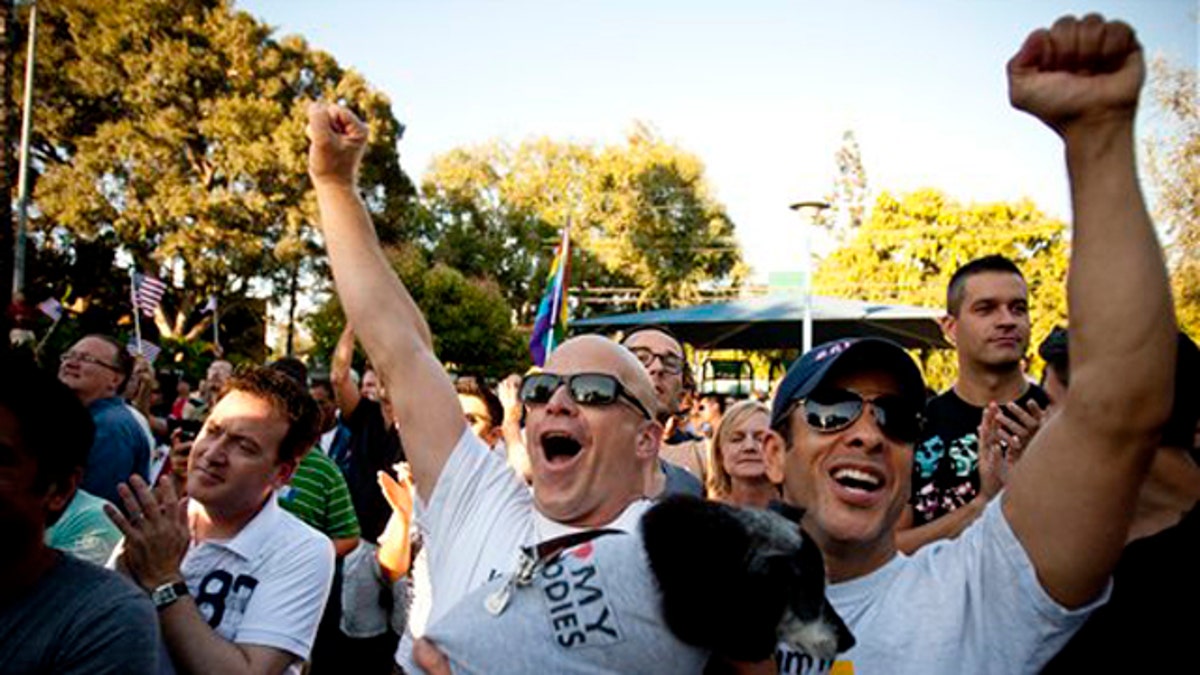
Proposition 8 opponents Mark Allen, left, and his partner Allen Hidalgo cheer during a rally Aug. 4 in West Hollywood, Calif. (AP Photo)
The landmark decision rejecting California's same-sex marriage ban sets up a complicated and unpredictable legal fight that could inspire a chain reaction of challenges on both sides of the debate until the Supreme Court ultimately has its say.
Passions are running high in the wake of the ruling. Supporters of the voter-approved Proposition 8 cast Judge Vaughn Walker's decision as a rejection of the will of 7 million California voters, while opponents hailed the ruling as an historic victory and pledged to build on the momentum.
"We know that this is not the end," James Esseks, director of the ACLU Lesbian, Gay, Bisexual and Transgender Project, said in a statement.
For the time being, the District Court decision does not require the state to stop enforcing its ban. Walker, one of three openly gay federal judges in the country, issued a temporary stay on his decision while he considers waiting for the 9th Circuit Court of Appeals to rule.
But the case could ultimately end up before the Supreme Court -- and before that, the arguments could have widespread impact on similar bans elsewhere in the nation.
"There's no question that this decision will encourage additional challenges," said Jonathan Turley, law professor at George Washington University.
Thirty states have constitutional bans on same-sex marriage similar to California's. Though the 9th Circuit Court decision, wherever it falls, would not have to be taken as binding precedent in other circuits, it could influence similar challenges elsewhere.
The 9th Circuit also has direct jurisdiction over nine western states -- eight of which have constitutional bans on same-sex marriage. If the court upholds Walker's ruling, all of those bans could instantly be vulnerable to legal challenge, according to Jordan Lorence, senior counsel with the Alliance Defense Fund.
"There's nothing ... that would limit the reach of this to just California," he said.
Lorence said those states also might just wait for the Supreme Court to weigh in -- he expressed confidence that the 9th Circuit would ultimately reject Wednesday's decision. The Alliance Defense Fund is among the groups arguing in favor of the ban. He slammed the decision, saying, "this is one judge invalidating the decision of 7 million voters."
"There's all sorts of dynamics going on here," he said.
In the wake of the ruling, lawyers say the constitutionality of amendments defining marriage as between a man and a woman could be in flux until the Supreme Court weighs in.
Turley said the Supreme Court prefers to wait until splits in the circuit courts emerge before taking up such a controversial issue -- meaning a final ruling from the highest court in the land could come at the end of a long and winding set of lower-court rulings.
Even then, there's another possibility: Congress could pass an amendment to the U.S. Constitution.
But attorney Robert Massi said that's unlikely.
"If it goes to the Supreme Court. .. I really believe the votes will be there" to strike down a same-sex marriage ban, he said. "It changes the whole law of the land."
Only five states -- Massachusetts, Connecticut, Vermont, New Hampshire and Iowa -- and the District of Columbia have legalized same-sex marriage.
Walker's ruling marked the first time a federal court examined whether the U.S. Constitution allows states to outlaw same-sex marriage. Two same-sex couples, as well as San Francisco, filed the suit challenging Proposition 8.




